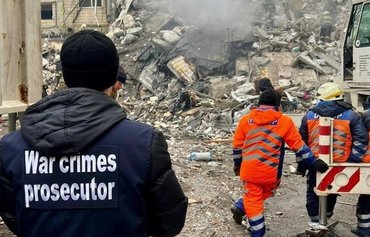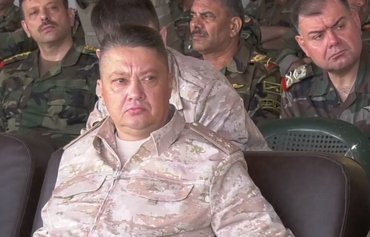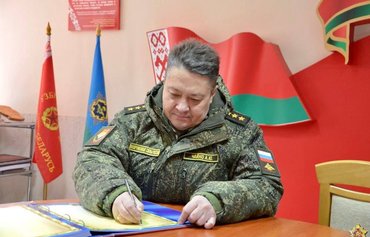Russian Col. Gen. Aleksandr Chaiko has returned to the news yet again after his failure to conclude new agreements between Russia and the Syrian Democratic Forces (SDF) over the Turkish military operation in northern Syria.
Chaiko, who was sacked in October as commander of Russia's Eastern Military District amid a string of battlefield reversals in Ukraine, is still leading troops -- once again as commander of Russia's forces in Syria.
The 52-year-old general had already headed Russian troops in Syria from September 2019 until at least September 2020, earning a global reputation for brutality.
More recently, Chaiko conferred twice with SDF commanders in northeast Syria in late November and early December on Turkey's warnings of a new military operation on its border with Syria, Al-Mayadeen TV reported.
![Defence Minister Shoigu (far left), Col Gen. Chaiko (2nd from left) and other Russian military officers talk with Syrian President Bashar al-Assad in 2020. [TASS]](/cnmi_am/images/2022/12/22/39885-chaikosyria_1_-600_384.jpg)
Defence Minister Shoigu (far left), Col Gen. Chaiko (2nd from left) and other Russian military officers talk with Syrian President Bashar al-Assad in 2020. [TASS]
![Civilians and White Helmets rescuers remove the rubble of a residential building in the city of Idlib, Syria, that took a direct hit in a Russian air strike on July 14, 2019. [White Helmets]](/cnmi_am/images/2022/12/22/39800-chaiko_2-600_384.jpg)
Civilians and White Helmets rescuers remove the rubble of a residential building in the city of Idlib, Syria, that took a direct hit in a Russian air strike on July 14, 2019. [White Helmets]
![Russian war correspondent Oleg Blokhin is said to have been arrested and then deported from Syria for criticising Chaiko's mismanagement of battles in Ukraine. [Oleg Blokhin/Telegram]](/cnmi_am/images/2022/12/22/39801-chaiko_3-600_384.jpg)
Russian war correspondent Oleg Blokhin is said to have been arrested and then deported from Syria for criticising Chaiko's mismanagement of battles in Ukraine. [Oleg Blokhin/Telegram]
Turkish President Recep Tayyip Erdoğan has been vowing a new incursion into northern Syria to push out Kurdish forces he blames for a November bombing that killed six people in Istanbul.
Kurdish groups deny involvement in that bombing. Russia has called for de-escalation along the Turkey-Syria border.
Chaiko, according to leaked reports, requested that the SDF withdraw from Manbij and Kobani and hand over those areas to the Internal Security Forces (Asayish) after they are merged into the Syrian security forces, Syrian journalist Mohammed al-Abdullah told Al-Mashareq.
"He also requested that the Syrian flag be raised on main and vital facilities and that the Tabqa Dam be handed over to the government," he said.
"This, in addition to an increase in the Syrian regime's share of oil extracted from SDF-controlled areas, and the regime's takeover of strategic crops and control of their distribution," he added.
Erdoğan told Russian President Vladimir Putin on December 11 that it was imperative for the Kremlin to "clear" Kurdish forces from the border "to a depth of at least 30km".
But Chaiko so far has failed to convince the Kurdish forces to withdraw from the border area.
"We reject all the demands," SDF spokesman Aram Hanna told Al-Arabiya on November 28, after Chaiko's first meeting with the SDF.
A 2019 agreement between Moscow and Ankara ended another offensive by setting up a 30km-deep "safe zone" to protect Turkey against cross-border attacks from Syrian territory.
Erdoğan accuses Russia -- a key player in the Syria conflict and backer of President Bashar al-Assad -- of failing to fulfill its promise to ensure the withdrawal of Kurdish units from the border of Turkey.
Some of the Kurdish forces are stationed in areas under Russian military control.
Others have been fighting with the United States against the "Islamic State of Iraq and Syria" (ISIS).
Idlib atrocities
In addition to his handling of the current situation in northeast Syria, Chaiko was implicated in some of the worst atrocities in the war-ravaged country, ranging from war crimes to corruption scandals to intimidation of critics of him and of Putin's policies.
In June, the United Kingdom sanctioned Chaiko for his actions in Syria, and Human Rights Watch (HRW) says he may bear command responsibility for violations during the 2019-2020 Idlib offensive, including widespread attacks on hospitals and schools and the use of indiscriminate weapons in populated areas.
At least 1,600 civilians were killed and some 1.4 million were displaced during the offensive on Idlib, according to HRW.
Still, Putin conferred the Hero of Russia award, the nation's highest honour, on Chaiko in 2020 and promoted him to colonel-general in June 2021.
"Since the start of the Ukraine war, Putin has faced opposition from a large number of senior generals over his decisions and how military operations are carried out," political analyst Ramez Mamdouh told Al-Mashareq.
"As a result, he now relies on a relatively small number of generals close to him, including Aleksandr Chaiko and Sergei Surovikin ... among others," he said.
"This group graduated from the war colleges at about the same time and took part in the same wars that Russia has been involved in from 1990 to date," Mamdouh said.
"That's why the main tasks are undertaken by [them], be they in Syria, Ukraine or some other region," he added.
Putin's insistence on relying on certain suspected war criminals, such as Chaiko and Surovikin, may cost him dearly and may lead to prosecution of Russia by the International Criminal Court if cases are filed over war crimes in both Syria and Ukraine, said Mamdouh.
'War criminal'
Chaiko "is nothing but a butcher and a war criminal", said Idlib activist Musab Assaf.
This was clearly evident in the attack on Idlib in 2019 and 2020, he said, noting that because Russian-backed Syrian forces could not advance on any of the fronts at that time, the Syrians and Russians pursued a scorched earth policy instead.
"That left hundreds dead and wounded and destroyed homes, health and service facilities and infrastructure, and some areas became uninhabitable," he said.
"Chaiko, who returned from Ukraine because of his abject failure to achieve Russia's set goals there, turned against Russian war correspondent Oleg Blokhin over the many criticisms he leveled against Chaiko for his mismanagement of the battles in Ukraine," Assaf said.
Chaiko reportedly ordered the arrest of Blokhin and his wife, whom the Syrians held for about a week in October before handing them over to Moscow, according to Assaf.
The Russian general "fears that Blokhin will expose corruption cases in which many Russian generals are implicated in Syria, including Chaiko and Surovikin", Assaf said.
These cases include setting up fictitious companies to extract and sell phosphate and trade in weapons, and receiving large commissions for smuggling oil from SDF-controlled areas and selling it on the black market, he said.

![Col. Gen. Aleksandr Chaiko. [File]](/cnmi_am/images/2022/12/22/39886-chaiko-600_384.jpg)






